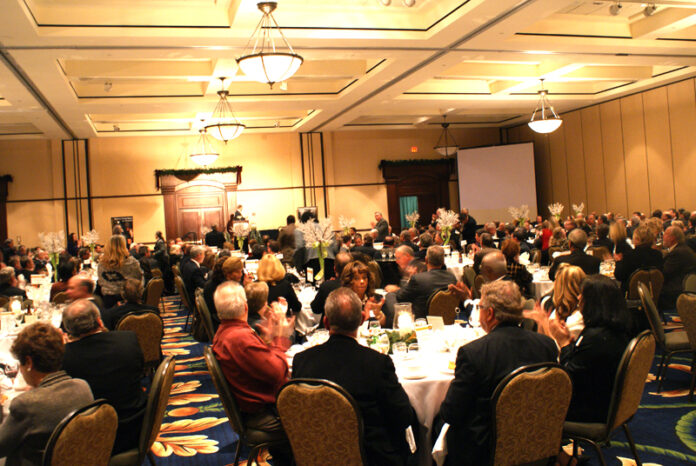
by Gene Marrano
During its annual membership meeting and banquet, the 122nd edition in fact, the Roanoke Regional Chamber of Commerce honored several people before former Governor Gerald Baliles addressed a packed house at Hotel Roanoke.
Feted were Backbone Club member of the year Joshua Bradley, Ambassador of the Year Ivy Dill, Roanoke City Police Officer of the Year Ronald Robinson and Roanoke County Police Officer of the Year John Musser. Bradley, a manager locally with Wells Fargo, brought in the most new memberships. Dill, a Vice President with First Citizens Bank, worked to increase membership retention by educating them on the Chamber’s mission. The Regional Chamber boasts about 1200 member organizations.
In Roanoke City, Officer Ronald Robinson was cited for apprehending subjects during an armed robbery where gunshots were fired. School resource officer John Musser was named Roanoke County Officer of the Year for his work in solving a series of burglaries involving stolen dirt bikes and motorcycles.
Baliles, the governor of Virginia in the late 1980’s, is the current director and CEO of the Miller Center at the University of Virginia, a non-partisan think tank that often looks at current issues through a historical perspective. Baliles noted the wide range of interests and assets in the region, and the blurring of local government boundaries where someone might work in one locality but live in another.
“I can tell you from personal experience that business prospects look at a region first,” said Baliles. “The future of this region…of so many different parts, will depend in large measure on whether the different parts see the whole picture and can work together as a region.”
That’s why the Roanoke Regional Chamber of Commerce is so important, said Baliles, “to help set the stage for the future [and] identify challenges confronting the region – to focus on what’s required to move forward, and to remain competitive in today’s uncertain economic climate.”
Baliles gave the audience a bit of a history lesson, explaining that recessions have been commonplace over the entire history of the country, although most have not been as pronounced as the current one. Virginia has experienced some of the strongest economic growth in the nation in recent years, said Baliles, often as a result of those who have moved here.
“The people who come here bring their ideas, their creativity …their biases and customs.” That’s had a greater impact on the Commonwealth than many realize, said Baliles. The State is also in closer partnership with the rest of the country in many ways, he contended. In this era of globalization and advanced technologies, the rules are changing he noted. An aging population in Virginia also means that fewer workers are in place to help fund programs for older people.
Baliles decried the partisan bickering in the General Assembly that has meant infrastructure needs have gone unfulfilled. This reiterated “the more certain we must be about wise public investments for our future prosperity.” The responsiveness of government at all levels is critical to meet the public’s needs, he added. “An educated citizen” is also a must to compete in today’s economy, said Baliles. Progress means building upon the accomplishments of predecessors, “not tearing them down and running from the financing of public needs.”
An “undeniably successful brand of politics,” has sprung up, said the former Democratic governor, one which declares that ignoring capital investment is the right way to go. Baliles warned against that approach: “strong commitments and sustained momentum help maintain an economy of growth that in turn that can produce the revenues needed to improve education and transportation.” Arts and culture, health care and other needs can also be addressed when there is growth.
Baliles said his beliefs from decades ago haven’t changed much over the years. “Those principles still inform my thinking today.” He enjoyed being governor “but between you and me, I don’t miss it.” That line drew some chuckles from the Chamber audience. “I’m here to tell you, there is life after politics. One can change course.”


